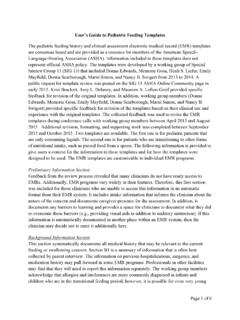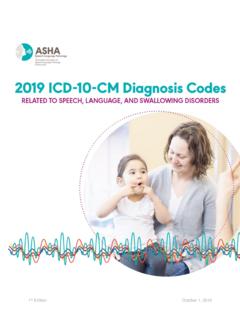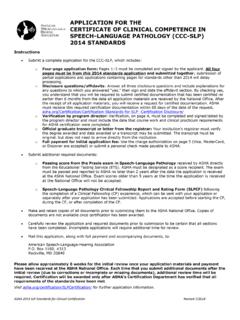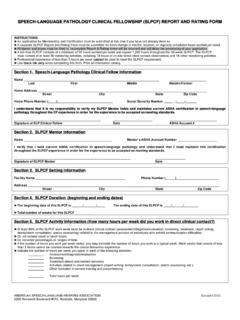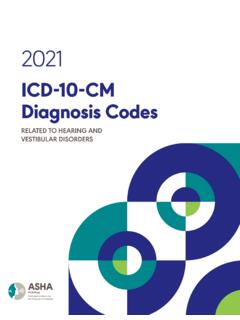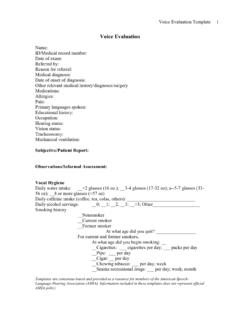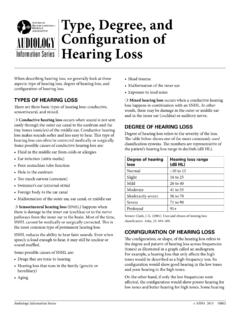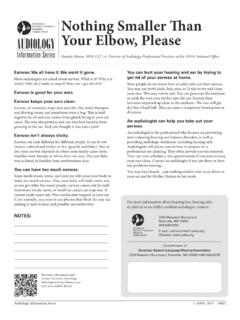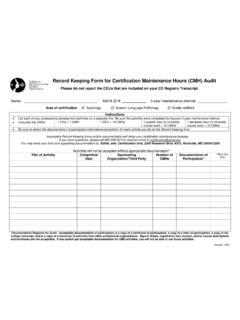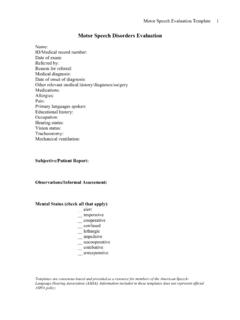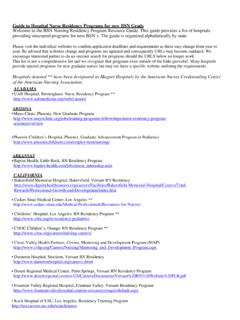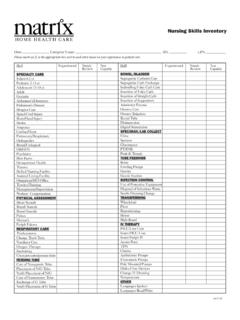Transcription of Pediatric Feeding History and Clinical Assessment Template ...
1 Pediatric Feeding History and Clinical Assessment Template (Liquids only ) Templates are consensus- based and provided as a resource for members of the American Speech- Language- Hearing Association (ASHA). Information included in these templates does not represent official ASHA policy. 1 A. Preliminary Information Reason for referral: _____ Chronological age (Adjusted age): _____ Primary caregiver: _____ Informant for evaluation: _____ Primary language: _____ Interpreter Family concerns _____ Barriers to learning: _____ B. Background Information B1. Summary Medical team (physicians, dentists, ): _____ Ancillary care team (nursing, therapists, ): _____ Previous Hospitalizations: _____ Previous Surgeries: _____ Medications: _____ Allergies/Intolerances: _____ Cultural preferences relevant to Feeding : _____ Pediatric Feeding History and Clinical Assessment Template (Liquids only ) Templates are consensus- based and provided as a resource for members of the American Speech- Language- Hearing Association (ASHA).
2 Information included in these templates does not represent official ASHA policy. 2 B2. Birth History Complications during pregnancy: _____ Delivery: Vaginal Cesarean- section: (reason) _____ Single Birth Multiple Birth: (define) _____ Complications during delivery: _____ Term Preterm: _____(weeks/days) NICU: (describe) _____ Birth weight: _____ APGAR Scores: _____ @ 1m, _____ @ 5 m, _____ @ 10 m B3. Congenital malformations, deformations, and chromosomal abnormalities Details: _____ _____ B4. Conditions/Disorders/Diseases of the nervous system Details: _____ _____ B5. Conditions/Disorders/Diseases of the circulatory system Details: _____ _____ B6.
3 Conditions/Disorders/Diseases of the respiratory system Details: _____ _____ B7. Conditions/Disorders/Diseases of the digestive system Details: _____ _____ B8. Conditions/Disorders/Diseases of the musculoskeletal system and connective tissue Details: _____ _____ B9. Neoplasms Details: _____ _____ B10. Mental, behavioral, and neurodevelopmental disorders Details: _____ _____ Pediatric Feeding History and Clinical Assessment Template (Liquids only ) Templates are consensus- based and provided as a resource for members of the American Speech- Language- Hearing Association (ASHA). Information included in these templates does not represent official ASHA policy.
4 3 B11. Injury, poisoning and other consequences of external causes Details: _____ _____ B12. Hearing impairment: _____ B13. Visual impairment: _____ B14. Diagnostic procedures completed (dates & results) MBS/VFSS: _____ FEES: _____ pH/Impedance probe: _____ Upper GI: _____ Gastric emptying/Milk Scan: _____ Other: _____ B15. Swallowing/ Feeding & Nutrition History Breastfeeding: Bottle Feeding : Other: Alternate Feeding methods (tube Feeding , parenteral nutrition, ) History of: Dehydration Poor Weight Gain Coughing/choking during or after drinking Gagging/vomiting during or after drinking Wet vocal quality during or after drinking Pain/discomfort during or after eating/drinking Details: _____ _____ Pediatric Feeding History and Clinical Assessment Template (Liquids only ) Templates are consensus- based and provided as a resource for members of the American Speech- Language- Hearing Association (ASHA).
5 Information included in these templates does not represent official ASHA policy. 4 C. Evaluation Information Bottle & Type of fluid: _____ Breast Average number and length of feedings: _____ People who feed infant: _____ Position(s) for Feeding : _____ Volume (daily intake): Formula: _____ Expressed breast milk: _____ Sensory preferences: _____ Infant drinks other fluid from bottle ( water): _____ Modifications to fluid: _____ Use of additives or supplements: _____ Before Assessment : State: _____ Respiratory Rate: _____ Oxygen saturation: _____ Pain Assessment : _____ Assessment Oral Motor/Peripheral All structures observed Yes No List structures not observed: _____ All structures within expected limits for age, sex, race.
6 Yes No Details if no: _____ Movement patterns, tone, and reflexes are appropriate for age Yes No Details if no: _____ Non- Nutritive Suckling: Adequate Impaired Not assessed Describe: _____ Oral sensory response Functional Signs of hypersensitivity Signs of hyposensitivity Describe: _____ Adequate secretion management: Yes No Describe if no: _____ Phonation: Functional Impaired Not applicable ( trach) Describe if impaired: _____ Signs of stress during Assessment : Yes No Describe if yes: _____ Oral Feeding : Feeding position: _____ Length of time spent Feeding : _____ Pediatric Feeding History and Clinical Assessment Template (Liquids only ) Templates are consensus- based and provided as a resource for members of the American Speech- Language- Hearing Association (ASHA).
7 Information included in these templates does not represent official ASHA policy. 5 Liquids trialed: _____ Fed by: Self Caregiver Clinician Drank from: Breast Bottle Other: _____ Sucking/Drinking skills were appropriate for age: Yes No Details if no: _____ Compensatory strategies trialed: _____ Results of compensatory strategies: _____ Concern for pharyngeal phase dysfunction: _____ Concern for esophageal phase dysfunction: _____ Oral sensory response: Functional Signs of hypersensitivity Signs of hyposensitivity Comments: _____ After Assessment : State: _____ Respiratory Rate: _____ Oxygen saturation: _____ Pain Assessment : _____ Other observations: _____ D.
8 Clinical Summary (Patient name) is a (age) (gender) that presents with (functional/dysfunctional) oral Feeding skills characterized by _____. Prognosis for safe oral intake: Good Fair Poor Prognosis for adequate oral intake: Good Fair Poor Strengths: _____ Concerns: _____ Diagnosis/ICD10: Dysphagia, unspecified Dysphagia, oral phase Dysphagia, oropharyngeal phase Other: _____ Recommendations: Continue oral Feeding , no modifications Continue oral Feeding with the following modifications: _____ _____ Instrumental evaluation of swallow function MBS/VFSS FEES Other: _____ Feeding therapy (see plan of care) Refer to Registered dietitian Gastroenterologist Pulmonologist Developmental pediatrician Pediatric Feeding History and Clinical Assessment Template (Liquids only ) Templates are consensus- based and provided as a resource for members of the American Speech- Language- Hearing Association (ASHA).
9 Information included in these templates does not represent official ASHA policy. 6 Other: _____ Additional recommendations: _____ _____ _____ Plan of care: Speech therapy intervention (is/ is not) recommended for (number of times/ week) for (time of sessions, such as 30 minutes) as tolerated for at least (number of weeks/months). Interventions include but are not limited to the following: _____ Long term goals: _____ _____ Short term goals: _____ _____ Education provided to family regarding results, recommendations, and plan. Barriers to learning: _____ Family demonstrated understanding of results, recommendations, and plan.
10 Reinforcement needed: _____
